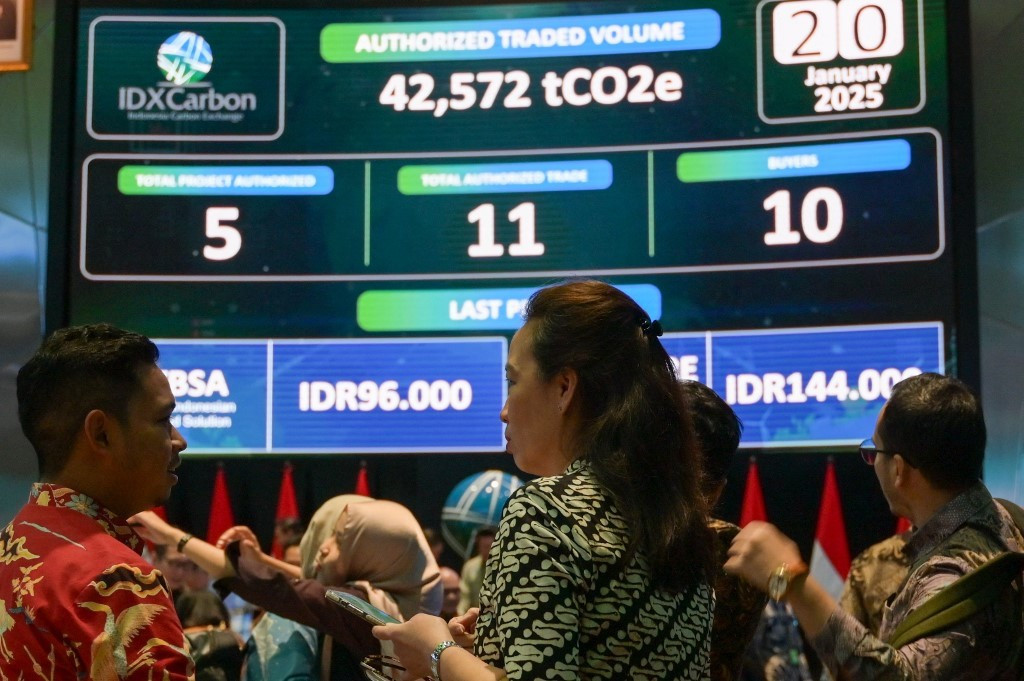News
International carbon trading at IDXCarbon seeks to revive sluggish market
Tenggara Strategics February 1, 2025 People watch carbon trading activity on a digital screen at the Indonesian stock exchange building in Jakarta on January 20, 2025. (AFP/Bay Ismoyo)
People watch carbon trading activity on a digital screen at the Indonesian stock exchange building in Jakarta on January 20, 2025. (AFP/Bay Ismoyo)
The Indonesia Carbon Exchange (IDXCarbon) launched its first international carbon trading platform on Monday, aiming to attract global buyers of carbon credits and revitalize a market that has seen declining activity over the past year. However, attracting international buyers hinges on credible certifications for carbon credits, which are currently issued solely by the Environment Ministry.
To draw more international participants, the government has prepared carbon credits of 2.48 million tonnes of carbon dioxide equivalent. These credits originate from four gas-fired power plants located in Priok (Jakarta), Muara Karang (Jakarta), Muara Tawar (Bekasi, West Java) and Grati (Pasuruan, East Java), as well as a mini hydropower plant in Gunung Wagul (Banjarnegara, Central Java).
The carbon credits will be priced higher than current rates at IDXCarbon. For example, technology-based solution (IDTBS) carbon units will be sold for Rp 96,000 (US$6.2) per tonne, while renewable energy (IDTBS-RE) carbon credits will be priced at Rp 144,000 per tonne. This represents a significant increase compared to the Rp 69,000 per tonne price of renewable energy-based credits traded on IDXCarbon's first trading day in 2023.
With the anticipated participation of international players, Environment Minister Hanif Faisol Nurofiq has set an ambitious target of raising US$65 billion through carbon trading by 2028. However, achieving this goal will be challenging, given the low trading volume at IDXCarbon to date.
Since its establishment in September 2023, IDXCarbon has recorded transactions totaling Rp 55.24 billion (US$3.63 million), with Rp 29 billion generated on the first trading day. On that day, Pertamina Geothermal Energy (PGEO) sold 13 carbon credits, equivalent to 460,000 tonnes of CO2e, at Rp 69,600 per unit. The buyers included major Indonesian banks and corporations in the mining sector. However, trading activity has since been minimal.
The Indonesian carbon market currently suffers from a lack of both supply and demand, rendering it illiquid. This inactivity is largely due to the voluntary carbon market mechanism, which does not require companies to reduce emissions. Transactions between PGEO and its buyers occur in the voluntary carbon market, or offset market (SPEGRK), which is one of two trading mechanisms available on IDXCarbon.
The second mechanism is the allowance market (PTBAE-PU), a cap-and-trade system for 99 coal-fired power plants (PLTUs) that have been assigned emission caps by the government. Under this system, PLTUs that exceed their emission caps can purchase credits from those emitting below their limits or from other sellers on IDXCarbon. However, these 99 PLTUs have been absent from IDXCarbon because of the government's decision to delay mandatory trading for PLTUs until 2025 or even 2026.
To stimulate the domestic carbon market, Indonesia could require these 99 PLTUs to trade on IDXCarbon. This move would significantly increase trading volumes, as participation would be compulsory for them.
Critics, however, have questioned the decision to open IDXCarbon to international buyers while Indonesia lacks robust independent third-party validation and verification of carbon credits. At present, all carbon credits in the country are issued solely by the Environment Ministry.
In addition to developing the carbon market, Indonesia plans to implement a carbon tax of at least US$2 per tonne of CO2e as part of its commitment to achieving net-zero emissions by 2060. The carbon tax policy was enshrined in the 2021 Tax Harmonization Law. The imposition of the carbon tax, however, has been delayed several times.
In Southeast Asia, only Singapore and Indonesia currently have direct carbon pricing policies in place. Carbon trading serves as a mechanism to exchange carbon credits, thereby reducing total greenhouse gas (GHG) emissions and meeting emissions reduction commitments. While Indonesia's carbon market is the first of its kind in the region, it requires significantly higher transaction volumes to achieve its goals.
As an emerging economy, Indonesia's carbon pricing, ranging from $2 to $18 per tonne, is considered too low compared to advanced economies such as South Korea and Sweden, where prices reach $30 and EUR 122 per ton, respectively. According to the Asian Development Bank, effective emissions reductions require carbon prices to fall within the range of $25 to $35 per tonne.
What we've heard
Several business actors and government sources have stated that the recent launch of carbon trading still raises technical concerns. One of the issues involves Corresponding Adjustment as regulated in Article 19 of Environment and Forestry Ministry Regulation (Permen LHK) No. 21/2022. This article is intended to prevent double counting, double claiming, and double payment in carbon trading.

